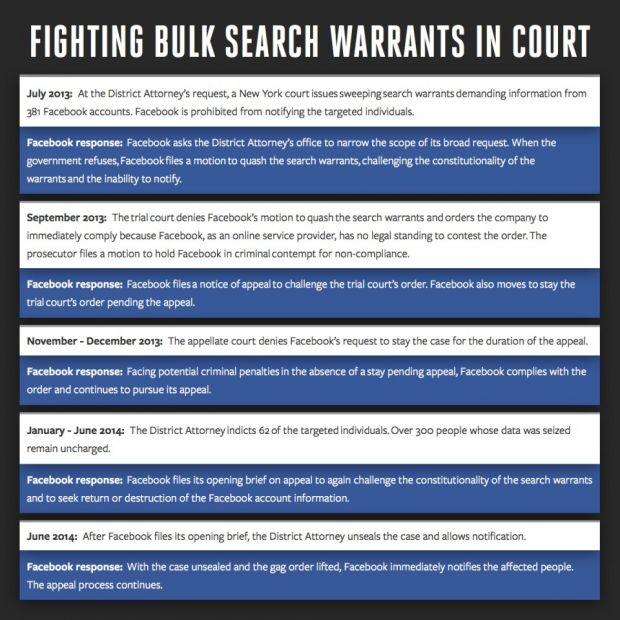Facebook has been fighting for its users without you knowing it for a while, pushing back against a set of search warrants that request private data from its user accounts.
“Since last summer, we’ve been fighting hard against a set of sweeping search warrants issued by a court in New York that demanded we turn over nearly all data from the accounts of 381 people who use our service, including photos, private messages and other information. This unprecedented request is by far the largest we’ve ever received—by a magnitude of more than ten—and we have argued that it was unconstitutional from the start,” writes Facebook’s Chris Sonderby, deputy general counsel.
The company has set down some ground rules for law enforcement requests and these are available to read for anyone interested. Normally, each of these demands is looked at closely by the company’s team, checking their legality and whether the documentation presented by the law enforcement officers is complete. All this data is then included in the Government Requests section of Facebook’s transparency report.
Receiving such demands is not uncommon for Facebook, especially since it has over 1 billion users, but the large number of accounts targeted by the bulk search warrant alarmed the social network. Despite its efforts to block the issue, Facebook was eventually forced to comply.
According to Sonderby, of the 381 people whose accounts were targeted by the warrants, 62 were later charged in a disability fraud case, leaving the other over 300 people with no charges against them. This means that Facebook was forced to hand out data on all these people to the government for nothing.
To make sure things were kept quiet, Facebook was put under a gag order by the US government which prohibited it from discussing the case and notifying the affected people until now.
The company says that it has gone to court and repeatedly told judges that these overly broad warrants that come with no date restrictions and allow the government to keep the data it seizes indefinitely violate the privacy rights of Facebook users and ignore the Fourth Amendment safeguards against unreasonable searches and seizures.
“We fought forcefully against these 381 requests and were told by a lower court that as an online service provider we didn’t even have the legal standing to contest the warrants. We complied only after the appeals court denied our application to stay this ruling, and after the prosecutor filed a motion to find us in criminal contempt,” states Sonderby.
So, a week ago, the company filed an appellate brief to try once again to invalidate this type of sweeping warrants that exposed over 300 people’s data for no purpose, but also to force the government to return the data it has seized and retained.
After the appeal was filed, the US government moved to unseal the warrants and the court filings, which is why we’re all aware of this now.
“We recognize that law enforcement needs to investigate potential crimes, but we believe all government data requests must be narrowly tailored, proportionate to the case, and subject to strict judicial oversight. Moreover, we believe search warrants for digital information should be specific and narrow in scope, just like warrants for physical evidence. These restrictions are critical to preventing overreaching legal requests and protecting people’s information,” Facebook states.

 14 DAY TRIAL //
14 DAY TRIAL // 

